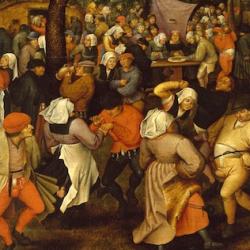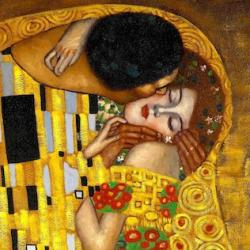In his contribution to Reformation Readings of Paul, David C. Fink argues that Luther’s doctrine of justification was an effort to “grapple with the great commandment” to love God (45). Luther vehemently rejected the medieval notion that faith as the material cause had to be formed by love as the formal cause of justification. He saw it as a reversion to the notion that law had to form faith to make it alive, and he saw this as an effort to turn Jesus into another Moses, another lawgiver.
Luther resolves the issue with “a temporal diremption between faith (fides) and love (charitas) as a way of isolating the latter from any implication in justification or the believer’s union with Christ.” Faith is a “unitive force” that, in Luther’s words, “takes hold of Christ and has Him present, enclosing Him as the ring encloses a gem.” Works and love come after the Bridegroom is “alone with His bride in His private chamber.” Faith is the intimacy of the closed bedroom; the works of love begin when the door is opened and the Bride begins to mingle with the household servants (46).
Fink notes that Luther’s most astute critics ask whether he has collapsed love into faith: “if faith is a unitive act, it is difficult to see how it can exist absent any element of desire.” The marital analogy seems to support this critique, but Fink says that this only seems to be the case because “early modern notions of marriage were rather different from our own. The evangelical reformers viewed marriage as a social arrangement ordered for the promotion of mutual support, the procreation of children and the avoidance of sexual sin. There was no assumption that sexual congress was an expression of genuine love, and Luther warned against confusing the two.” For Luther, “both in the marriage union and the believer’s union with Christ, genuine love arises only in the context of a relationship constituted by mutual trust and fidelity” (46-47).
Several responses to this. First, even if we grant Fink’s distinction between Reformation-era and post-Romantic understandings of marriage, we are still left with questions about the biblical understanding of marital love. Isn’t the Song of Songs relevant? Or, to make the same point another way: Luther’s distinction seems be reducible to a distinction between agape and eros: The former, not the latter, is the essence of marital love, and of the fidelity of the believer. But – again with the Song in mind – is that a distinction that arises from Scripture?
Second, I renounce merit, but that still leaves the question: Does it make biblical sense to speak of a faith that is wholly evacuated of love, a faith that is purely faith and not also love? Does it make biblical to suppose there might be some human faculty or organ that is capable of this pure faith from which love has been purged?
Finally, again supposing Fink is right on the historical question: The point might be that, for medievals and early moderns, love actually reduced to fidelity. That is certainly close to the meaning of “love” in feudal contexts, in Shakespearean political contexts, etc. Do you love me? doesn’t mean Do you strongly desire me? but Are you my faithful friend and ally? But if that’s the case, then the sharp distinction between love and faith seems to evaporate. And that leaves an historical question (which I am asking, and not answering): To what degree were medieval theologians who spoke of the in-forming power of love using “love” in a sense that is very close to Luther’s “faith”?














